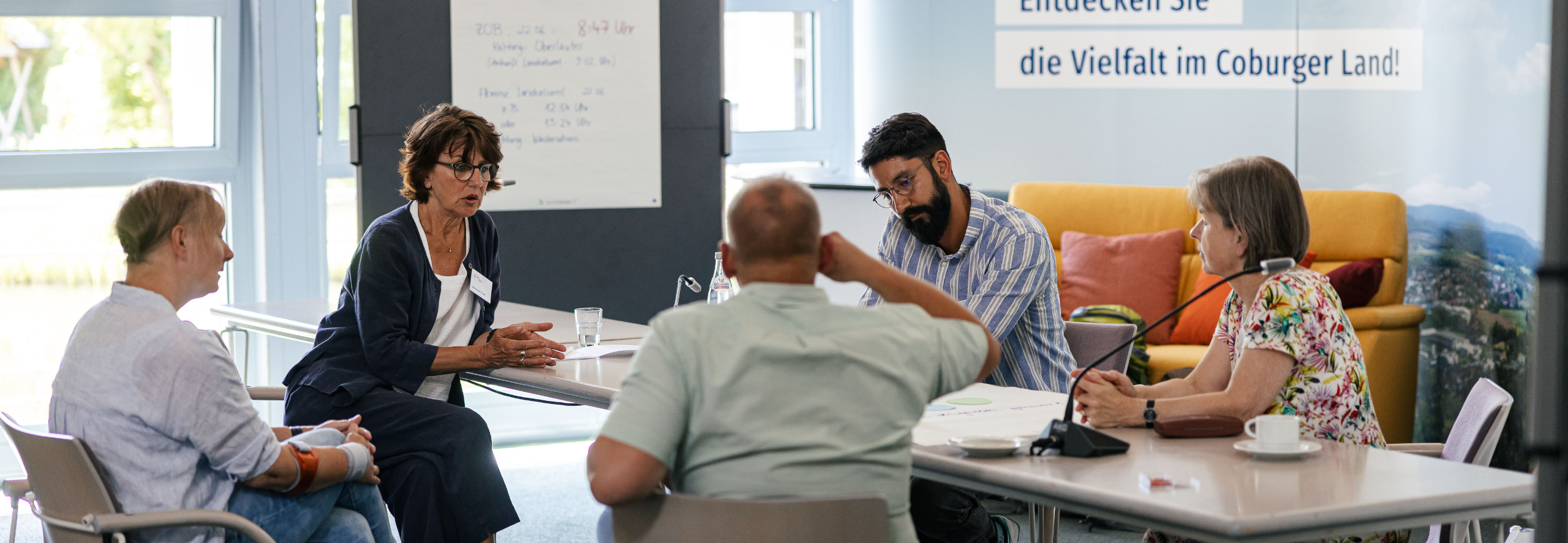About Land.Zuhause.Zukunft.
Many municipalities in rural areas have recognized that immigration as well as the integration and participation of immigrants are important topics for the future, not least because of demographic change and the challenges of rural development. Ensuring the integration and participation of newcomers requires sustainable strategies and concepts, local cooperation between politics, administration, civil society and business, as well as political and social conditions that foster such processes. In this context, newcomers are powerful local actors, self-effective and decisive in shaping successful, future-oriented approaches and ideas.
Vision
Land.Zuhause.Zukunft. aims to ensure that newcomers become a natural part of society in rural areas. The active shaping of immigration is an opportunity for administration, civil society and local business to create attractive prospects for newcomers to stay. We know that local actors – including immigrants themselves – hold great potential and the motivation to shape diversity in a positive, sustainable way. Therefore we cherish their expertise and understanding of local issues, challenges and resources. Only through their active engagement, the vision of Land.Zuhause.Zukunft. can evolve and turn into reality.

Objectives
Land.Zuhause.Zukunft. aims to support rural actors in developing innovative approaches and strategies in integration policy. The program intends to strengthen active networking among all participating municipalities as well as the exchange of good practice. Moreover, Land.Zuhause.Zukunft works to raise the awareness of policymakers at the state and federal levels towards the needs, challenges and resources of rural areas. The program wants to ensure that new immigrants are perceived and involved in this context as essential actors in shaping an open integration policy.
Program Structure
Land.Zuhause.Zukunft. has established a platform through the Forum Integration in Rural Areas to facilitate networking between districts, knowledge exchange, and the transfer of expertise. This forum will continue its work in the current phase of the program. Members of the forum are provided with a budget that they can use, for example, to go on learning exchanges or organize local events in order to gain new insights for their own work.
In addition to specialized events for participating district representatives, the program office organizes a larger conference in each program phase. This conference addresses a wide range of stakeholders involved in integration efforts in rural areas. In the current phase of the program, the conference will focus on the key topic of digitalization.
The program office also supports rural districts in communicating their needs and experiences by, for example, preparing short expert briefs on various topics.
Key Topics
In the current third program phase of Land.Zuhause.Zukunft., selected topics are being explored in greater depth. These priorities are based on insights gained from previous counseling processes, exchanges with members of the Forum Integration in Rural Areas, and expert briefs. In addition to the expertise of our partner districts, the development of these topics draws on academic research and input from further experts, who are involved through workshops and interviews. If you are interested in contributing to the work on these topics, please feel free to get in touch with the program office team.
Migration and Integration Councils
In this program phase, we will analyze how migration or integration councils need to be structured and organized in order to truly serve as bodies for political participation for people with a migration background in rural areas. Alongside reviewing academic findings and examples from practice in Germany, international best practices will also be identified. Based on this, opportunities for transforming existing councils or establishing new ones will be explored and piloted in cooperation with selected rural municipalities.
Integration of Skilled Workers and Employees
Which actors are crucial for the lasting integration of international employees in rural areas – both within companies and beyond? How can networking formats improve the quality of collaboration between actors as well as the overall framework conditions for the long-term integration of migrants in rural areas? By interviewing migrants, we aim to identify key factors and stakeholders that positively influence their decision to stay permanently.
Digitalization
To what extent can new technologies provide opportunities and reduce workloads in the field of integration of new migrants in rural areas? Which digital approaches have already been developed to improve access for people with a migration background to public administration and social integration? What factors influence their successful implementation, and what lessons can be learned for future development? In the current program phase, concrete options for action for those involved in integration work are to be identified. The potential of digital technologies for integration in rural areas, the specific challenges of implementation under local conditions, and the needs of the target groups will be highlighted.
Consulting in Previous Program Phases
Together with its consulting partners Kompetus and Ramboll, Land.Zuhause.Zukunft. supported districts from various regions of Germany between 2018 and 2024 in addressing their specific challenges related to the integration of newcomers. Over the course of a one-year counseling process, the districts developed concepts and approaches tailored to their own local conditions and experiences. You can find more information on the topics of the counseling process here.

